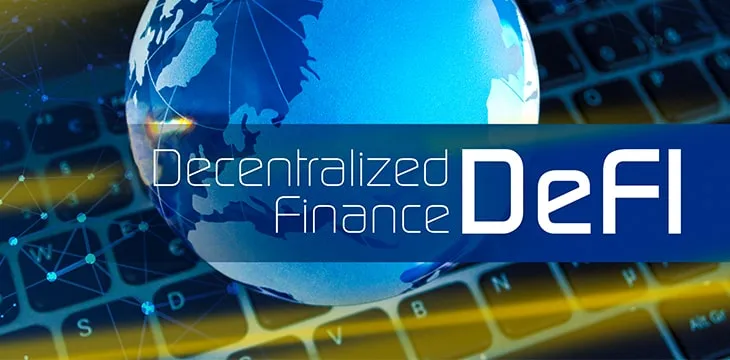|
Getting your Trinity Audio player ready...
|
“Full and honest disclosure remains the cornerstone of our securities laws – no matter what technologies are used to offer and sell those securities.” – Gurbir S. Grewal, Director of the SEC Enforcement Division
It’s been a long time coming, but if the last year has taught us anything, it’s that law is coming to the digital currency and blockchain industries.
The U.S. Securities and Exchange Commission (SEC) recently brought charges against two Florida men, Gregory Keough and Derek Acree, and their Cayman Islands company for raising $30 million by selling illegal securities via so-called smart contracts.
It’s the latest in a series of actions by the SEC and other regulators that indicate the law has finally caught up with the industry and is no longer buying the “it’s decentralized, so the laws don’t apply” narrative.
What happened with DeFi Money Market?
DeFi is short for decentralized finance. It’s an idea promoted within the digital currency space that any two parties can connect through online platforms, and both lend and borrow money without licenses, KYC checks, or compliance with any of the existing finance laws.
In this particular case, the SEC alleges that Keough and Acree sold illegal securities on a specific platform, DeFi Money Market, through their company Blockchain Credit Partners.
According to the SEC statement on the case:
- The pair offered and sold illegal securities on DeFi Money Market between February 2020 and February 2021.
- They sold two types of tokens: mTokens to earn interest and DMG governance tokens that supposedly gave holders both voting rights and a share of profits.
- Keough and Acree told investors that they could pay the interest because they would buy real-world assets but soon discovered they could not meet these obligations because of the price volatility of the digital assets involved.
- The SEC alleges that they never came clean with investors but instead misrepresented the facts and used both personal funds and funds from another company they owned to make interest payments.
Daniel Michael, the chief of the SEC’s Complex Financial Instrument Unit, echoed what Dr. Craig Wright has been saying for years when he stated, “The federal securities laws apply with equal force to age-old frauds wrapped in today’s latest technology.” In other words, it’s old wine in new bottles.
As this case and others like it show, DeFi cannot escape the law. While it has become somewhat of a mantra in the digital currency space that the law should bend to accommodate new technology, lawmakers see it differently. We’re seeing more and more evidence of this as powerful political forces like the European Union begin to understand the industry and legislate accordingly.
If DeFi goes down, what’s next for Ethereum?
Ethereum has been through several image overhauls since it launched in July 2015. Ask any two Ethereans what it actually is, and you’re liable to get a range of answers from a global settlement layer, to a world computer, to a platform for decentralized apps (Dapps). While some Ethereum-based applications are ceasing operations because of the gas fees and congestion, Ethereum enthusiasts are certain that this platform is the future of everything.
Regardless of what it’s supposed to be, Ethereum has been at the center of DeFi, which began to take off in late 2019. DeFi platforms like Aave run on it, and billions of dollars have changed hands without a thought for Know Your Customer or Anti-Money Laundering laws. Defi proponents are convinced these laws do not apply due to the global nature of the industry and supposedly ‘decentralized’ nature of DeFi platforms. Nonetheless, we have seen some popular DeFi platforms like Uniswap grow more cautious as the noose begins to tighten around DeFi.
if Uniswap is delisting tokens on their frontend for regulatory reasons, you should also consider whether the no-KYC stablecoins that account for the vast majority of the platform's utility are sustainable
the majority of the "DeFi" economy is a LARP and can be easily outlawed
— Kyle Torpey (@kyletorpey) July 23, 2021
What the case involving DeFi Money Market shows is that authorities are beginning to get wise to DeFi and clamp down on it. Just as the mass fraud unleashed during the ICO boom ended with a bang in 2018, many believe DeFi will end the same way.
Bitcoin was designed to comply with all existing laws
When Satoshi Nakamoto lost control of the Bitcoin protocol, it fell into the hands of anarchists and criminals who fundamentally misunderstood it and used it for nefarious purposes. For example, mistaking Bitcoin for an anonymous and untraceable cryptocurrency, Silk Road boss Ross Ulbricht ended up behind bars for life.
However, the original Bitcoin protocol is back. Having been restored to its initial form as outlined in the 2008 Bitcoin whitepaper; it is fully legally compliant, just as Satoshi designed it to be. BSV is the antithesis of most of what’s going on in the digital currency industry today.
To learn more about how Bitcoin enterprise blockchain is compatible with existing financial laws and can help regulators and enforcement agencies spot, track, and prosecute financial crime, listen to its inventor explain how it is an immutable evidence trail and honest money; not a ‘cryptocurrency’ for crooks and anarchists to flout the law with.
The era of crime in the digital currency industry is almost over. As the DeFi Money Markets case illustrates, the law is catching up, and it’s catching up quickly.
Follow CoinGeek’s Crypto Crime Cartel series, which delves into the stream of groups—from BitMEX to Binance, Bitcoin.com, Blockstream, ShapeShift, and Ethereum—who have co-opted the digital asset revolution and turned the industry into a minefield for naïve (and even experienced) players in the market.

 09-16-2025
09-16-2025 





